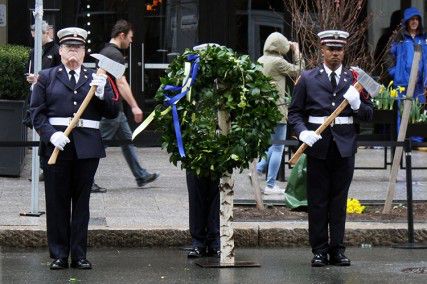
When Patrick Downes lost his left leg in the 2013 Boston Marathon bombings, he gained a community of strangers willing to give their time and support. After running the marathon with his wife Jessica, who also lost her left leg, Downes witnessed firsthand the goodness of Boston’s first responders, medical personnel and community members.
“We chose to love and that has made all the difference,” he said at a Tuesday tribute in honor of those affected by the bombings. “We [the victims of the marathon] wish that all of you, at some point in your lives, feel as loved as we’ve felt in the past year.”
On the anniversary of the Boston Marathon bombings, a tribute was held on Boylston Street to remember the victims, support the continually healing survivors and honor the first responders and medical personnel who were first on the scene after two bombs went off at the finish line, which injured more than 260 people and killed three.
The program began with a series of speeches at Hynes Convention Center with nearly 2,700 people in attendance. At the conclusion of the memorial, all attendees and other members of the public were invited to a flag-raising ceremony outside of the Forum Restaurant, where the first bomb went off. A moment of silence was observed at 2:49 p.m., the time of the first bombing.
“We own the finish line,” said U.S. Vice President Joe Biden, the event’s final speaker. “Next Monday, on Patriot’s Day, when I’m told up to 36,000 people line up to start the marathon, you will send a resounding message around the world that we will never yield. America will never stand down.”
Prior to Biden’s speech, Massachusetts Gov. Deval Patrick, Boston Mayor Martin Walsh, former Mayor Thomas Menino, Boston Athletic Association Executive Director Tom Grilk and Rev. Liz Walker shared words of gratitude and optimism with the audience, while remembering the lives of Krystle Campbell, Sean Collier, Lu Lingzi and Martin Richard, who died as a result of the bombings or during the manhunt that followed.
Marathon survivors Downes, Luis Yepez, David Yepez and Adrianne Haslet-Davis spoke about their experiences at the finish line and the journey they have taken toward recovery in the past year. Between speeches, the program featured musical performances from a variety of guests, including the Boston Pops Esplanade Orchestra and the Boston Children’s Chorus.
Menino, who was welcomed to the stage with a standing ovation, said the anniversary of the marathon bombings will always be a hard day for the Boston community, but there’s a comfort in gathering with family and friends.
“For family and friends, who will always miss their loved ones, you are strong at this broken place,” he said. “That strength thrives even in the hardest of days because of you, because of the passion that took hold of this city. It’s the heartbeat of Boston, and it’s a mighty force. This day will always be hard, but this place will always be strong.”
A variety of firsthand responders, medical personnel and marathon volunteers attended the tribute event, many of who will be attending the 118th Boston Marathon on Monday.
Dr. Lyle Micheli, who has been the medical coordinator at the finish line since 1975, told reporters the medical care at this year’s finish line would be significantly different. At least 10 trauma kits have been purchased from the Israeli Defense Force to keep at the finish line in the event that a runner or attendee needs a sterile dressing, splint or other urgent medical care.
“Our great frustration was that we had no equipment [last year],” he said. “We didn’t expect wounds. We’re there to take care of runners who are dehydrated or hypothermic. It was a sneak attack, and it’s not going to scare us away. It makes us realize the potential vulnerability we all have.”
Walsh said the Marathon bombings tested Boston’s faith and produced a new sense of perseverance that will be felt in this year’s marathon.
“We are learning not just perseverance, but resilience … resilience rooted in hope,” he said. “The 118th marathon will be a living, breathing example of our city’s resilience. We have survived the dark night to face the future with hope and confidence.”
Patrick, who took the stage after Walsh, said the tragedy of the Marathon bombings revealed the strength of Boston and the triumph of the community.
“There are no strangers here,” he said. “We are all connected to each other, to events beyond our control, to a common destiny.”
At the conclusion of Biden’s speech, he said the Marathon survivors, first responders and other members of the Boston community are defined by their courage and redeemed by their loyalty, which is a lesson his mother taught him as a child.
“You’ve become the face of America’s resolve,” he said. “No memorial, no words, no acts, can fully provide the solace that your heart still yearns, but I hope it eases your grief.”





















































































































